Leadership: Skills, Traits, Expertise - A Critical Analysis Essay
VerifiedAdded on 2022/11/09
|5
|766
|225
Essay
AI Summary
This essay delves into the ongoing discussion of whether leadership is more dependent on inherent traits or acquired skills. It examines the trait approach, which identifies characteristics like integrity, self-confidence, and intelligence as crucial. The essay then contrasts this with the skills-based approach, highlighting the importance of experience and problem-solving abilities. Through a review of research, including Stogdill's findings and the work of Germain, Swanson, and Holton, the essay argues that while skills can be developed, certain foundational traits are essential for a leader to effectively utilize and acquire expertise. The essay concludes that a combination of both is vital, but the presence of inherent traits is a prerequisite for effective leadership, emphasizing the need for careful leader selection and training.
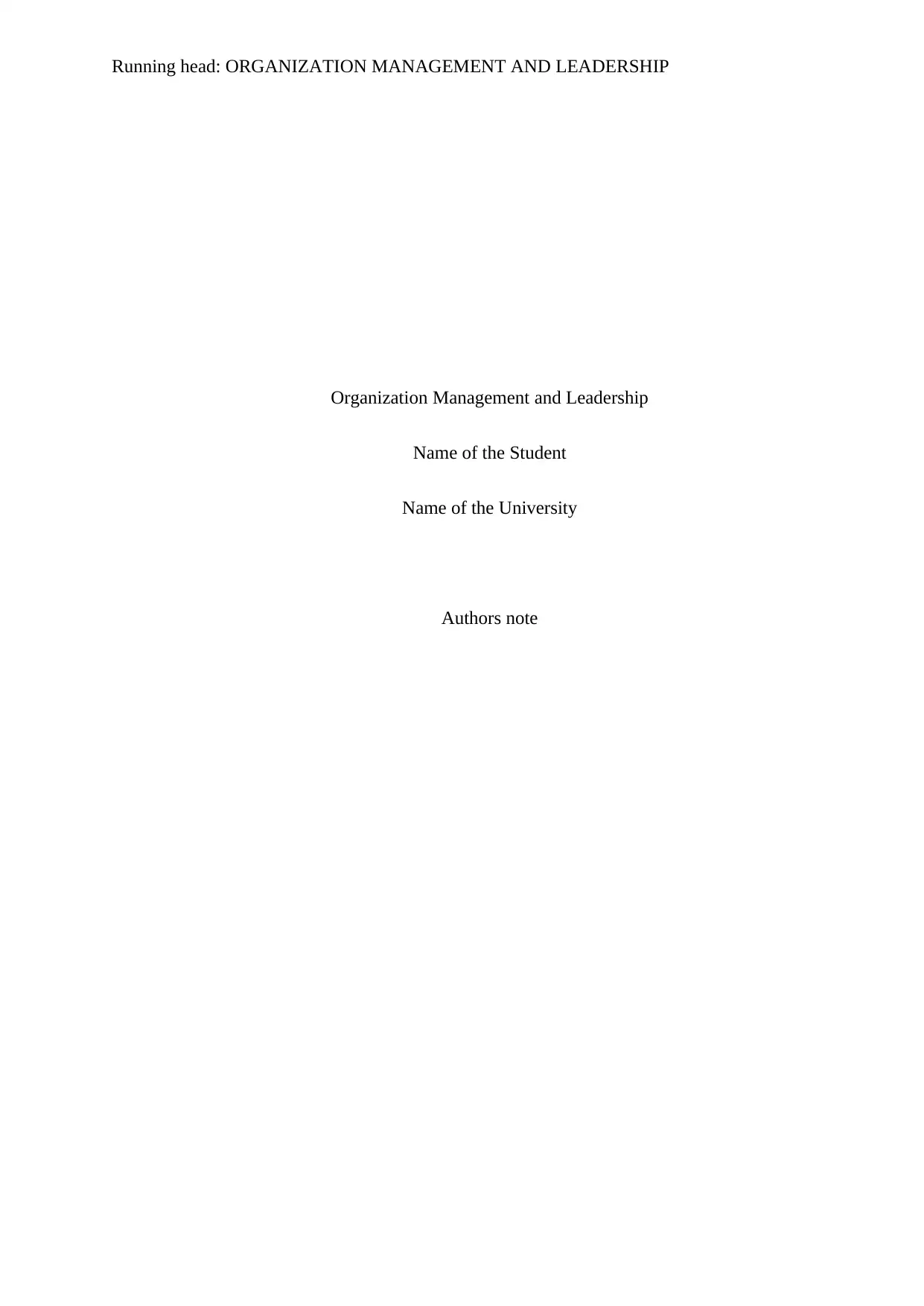
Running head: ORGANIZATION MANAGEMENT AND LEADERSHIP
Organization Management and Leadership
Name of the Student
Name of the University
Authors note
Organization Management and Leadership
Name of the Student
Name of the University
Authors note
Paraphrase This Document
Need a fresh take? Get an instant paraphrase of this document with our AI Paraphraser
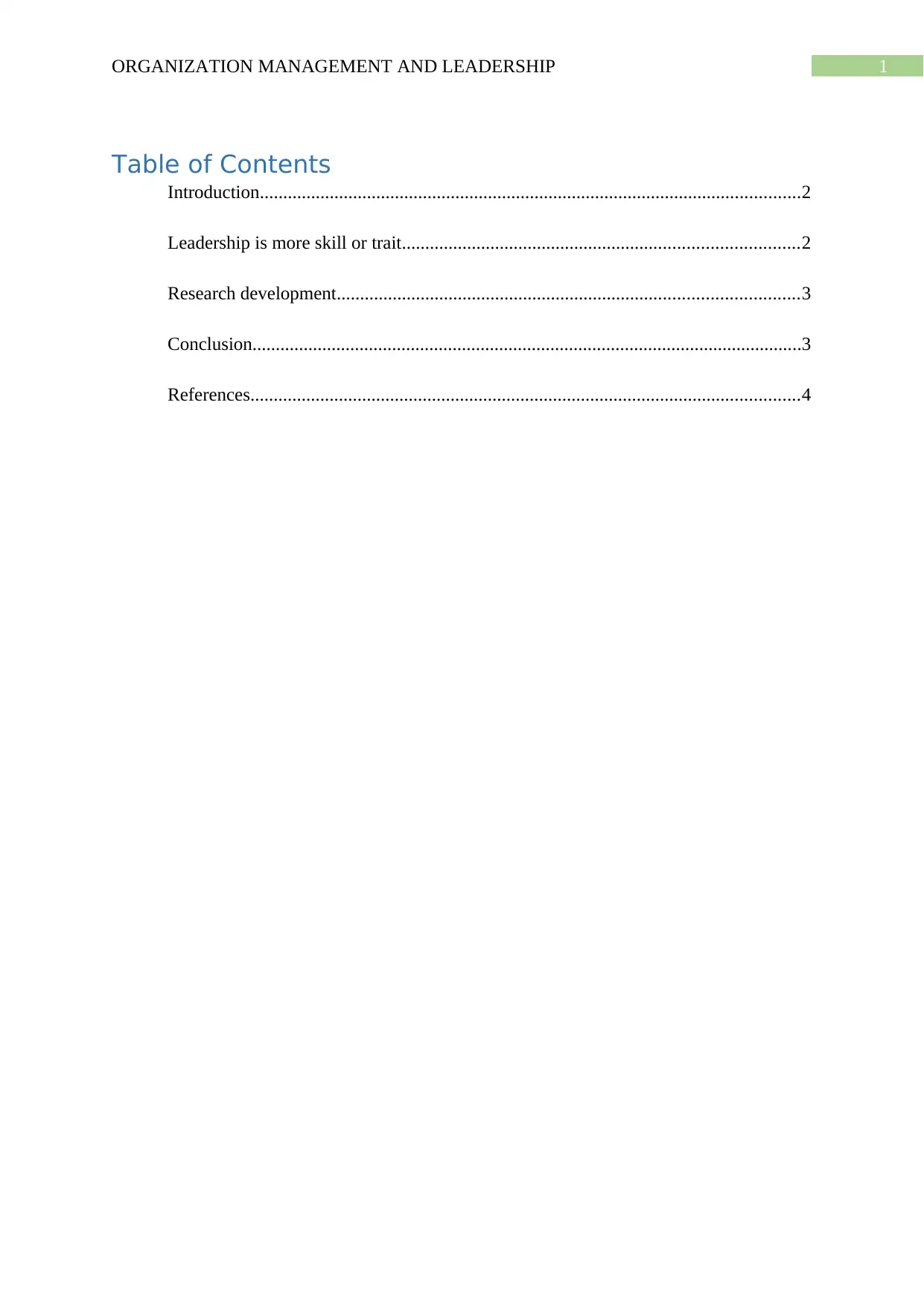
1ORGANIZATION MANAGEMENT AND LEADERSHIP
Table of Contents
Introduction....................................................................................................................2
Leadership is more skill or trait.....................................................................................2
Research development...................................................................................................3
Conclusion......................................................................................................................3
References......................................................................................................................4
Table of Contents
Introduction....................................................................................................................2
Leadership is more skill or trait.....................................................................................2
Research development...................................................................................................3
Conclusion......................................................................................................................3
References......................................................................................................................4
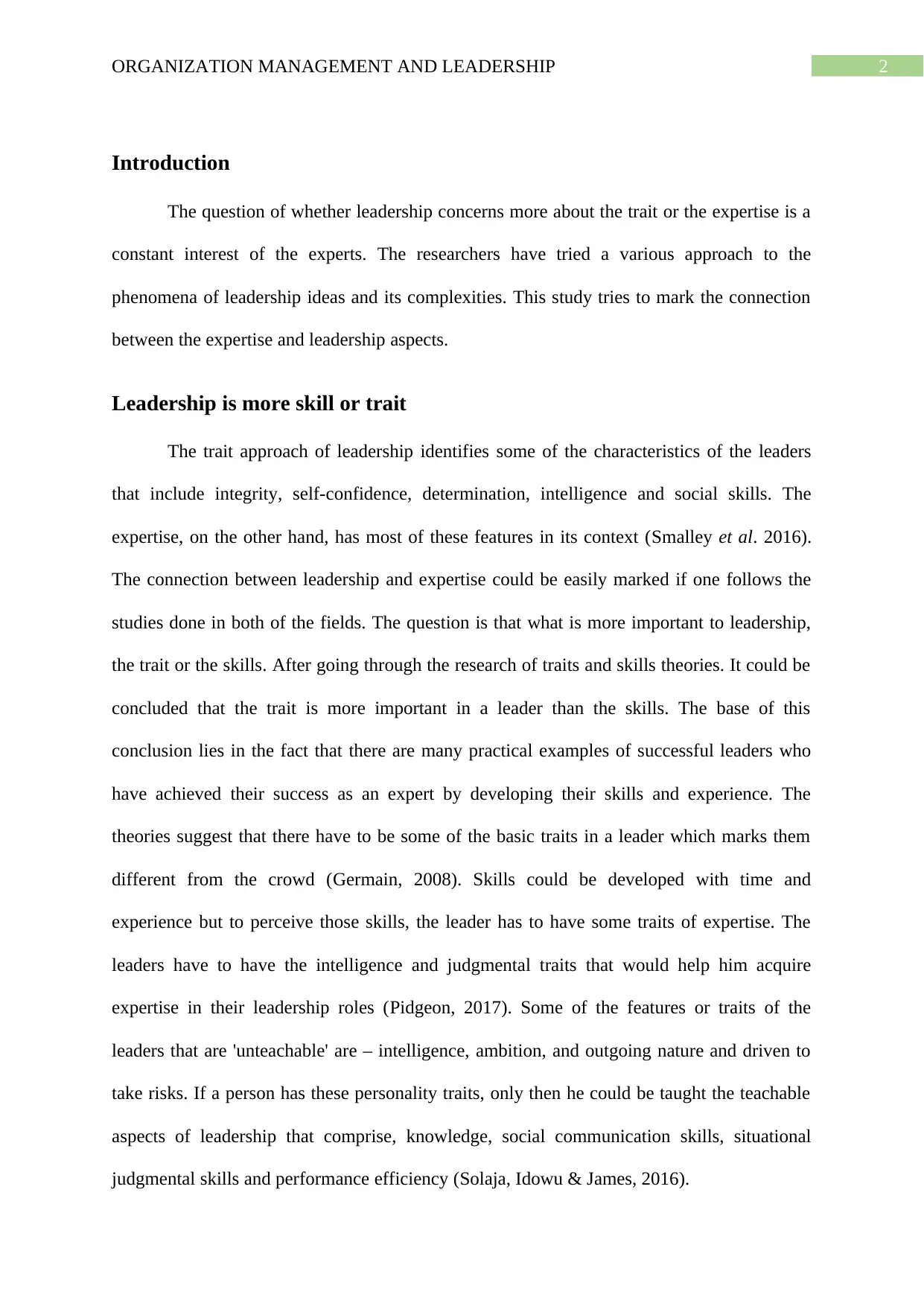
2ORGANIZATION MANAGEMENT AND LEADERSHIP
Introduction
The question of whether leadership concerns more about the trait or the expertise is a
constant interest of the experts. The researchers have tried a various approach to the
phenomena of leadership ideas and its complexities. This study tries to mark the connection
between the expertise and leadership aspects.
Leadership is more skill or trait
The trait approach of leadership identifies some of the characteristics of the leaders
that include integrity, self-confidence, determination, intelligence and social skills. The
expertise, on the other hand, has most of these features in its context (Smalley et al. 2016).
The connection between leadership and expertise could be easily marked if one follows the
studies done in both of the fields. The question is that what is more important to leadership,
the trait or the skills. After going through the research of traits and skills theories. It could be
concluded that the trait is more important in a leader than the skills. The base of this
conclusion lies in the fact that there are many practical examples of successful leaders who
have achieved their success as an expert by developing their skills and experience. The
theories suggest that there have to be some of the basic traits in a leader which marks them
different from the crowd (Germain, 2008). Skills could be developed with time and
experience but to perceive those skills, the leader has to have some traits of expertise. The
leaders have to have the intelligence and judgmental traits that would help him acquire
expertise in their leadership roles (Pidgeon, 2017). Some of the features or traits of the
leaders that are 'unteachable' are – intelligence, ambition, and outgoing nature and driven to
take risks. If a person has these personality traits, only then he could be taught the teachable
aspects of leadership that comprise, knowledge, social communication skills, situational
judgmental skills and performance efficiency (Solaja, Idowu & James, 2016).
Introduction
The question of whether leadership concerns more about the trait or the expertise is a
constant interest of the experts. The researchers have tried a various approach to the
phenomena of leadership ideas and its complexities. This study tries to mark the connection
between the expertise and leadership aspects.
Leadership is more skill or trait
The trait approach of leadership identifies some of the characteristics of the leaders
that include integrity, self-confidence, determination, intelligence and social skills. The
expertise, on the other hand, has most of these features in its context (Smalley et al. 2016).
The connection between leadership and expertise could be easily marked if one follows the
studies done in both of the fields. The question is that what is more important to leadership,
the trait or the skills. After going through the research of traits and skills theories. It could be
concluded that the trait is more important in a leader than the skills. The base of this
conclusion lies in the fact that there are many practical examples of successful leaders who
have achieved their success as an expert by developing their skills and experience. The
theories suggest that there have to be some of the basic traits in a leader which marks them
different from the crowd (Germain, 2008). Skills could be developed with time and
experience but to perceive those skills, the leader has to have some traits of expertise. The
leaders have to have the intelligence and judgmental traits that would help him acquire
expertise in their leadership roles (Pidgeon, 2017). Some of the features or traits of the
leaders that are 'unteachable' are – intelligence, ambition, and outgoing nature and driven to
take risks. If a person has these personality traits, only then he could be taught the teachable
aspects of leadership that comprise, knowledge, social communication skills, situational
judgmental skills and performance efficiency (Solaja, Idowu & James, 2016).
⊘ This is a preview!⊘
Do you want full access?
Subscribe today to unlock all pages.

Trusted by 1+ million students worldwide
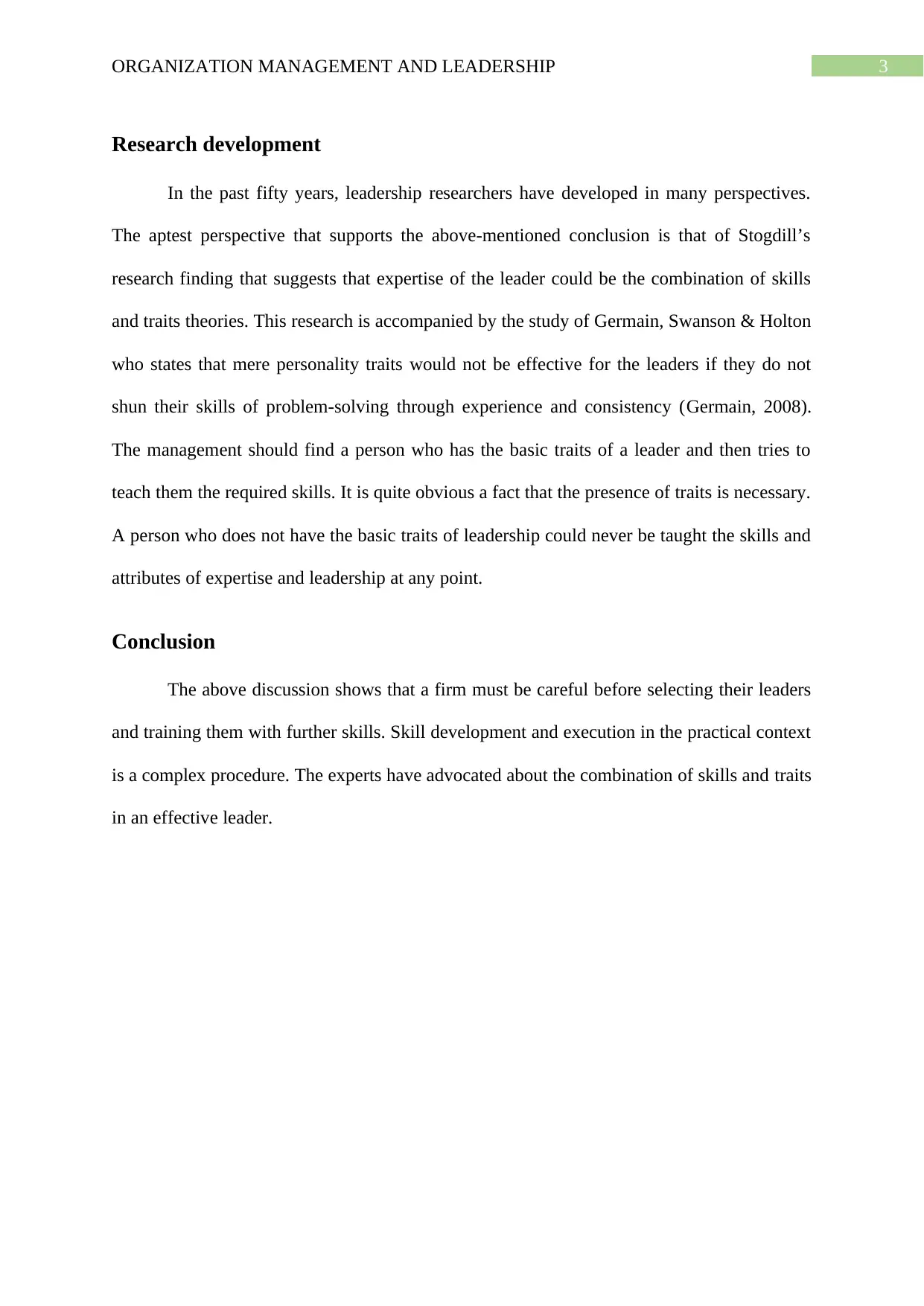
3ORGANIZATION MANAGEMENT AND LEADERSHIP
Research development
In the past fifty years, leadership researchers have developed in many perspectives.
The aptest perspective that supports the above-mentioned conclusion is that of Stogdill’s
research finding that suggests that expertise of the leader could be the combination of skills
and traits theories. This research is accompanied by the study of Germain, Swanson & Holton
who states that mere personality traits would not be effective for the leaders if they do not
shun their skills of problem-solving through experience and consistency (Germain, 2008).
The management should find a person who has the basic traits of a leader and then tries to
teach them the required skills. It is quite obvious a fact that the presence of traits is necessary.
A person who does not have the basic traits of leadership could never be taught the skills and
attributes of expertise and leadership at any point.
Conclusion
The above discussion shows that a firm must be careful before selecting their leaders
and training them with further skills. Skill development and execution in the practical context
is a complex procedure. The experts have advocated about the combination of skills and traits
in an effective leader.
Research development
In the past fifty years, leadership researchers have developed in many perspectives.
The aptest perspective that supports the above-mentioned conclusion is that of Stogdill’s
research finding that suggests that expertise of the leader could be the combination of skills
and traits theories. This research is accompanied by the study of Germain, Swanson & Holton
who states that mere personality traits would not be effective for the leaders if they do not
shun their skills of problem-solving through experience and consistency (Germain, 2008).
The management should find a person who has the basic traits of a leader and then tries to
teach them the required skills. It is quite obvious a fact that the presence of traits is necessary.
A person who does not have the basic traits of leadership could never be taught the skills and
attributes of expertise and leadership at any point.
Conclusion
The above discussion shows that a firm must be careful before selecting their leaders
and training them with further skills. Skill development and execution in the practical context
is a complex procedure. The experts have advocated about the combination of skills and traits
in an effective leader.
Paraphrase This Document
Need a fresh take? Get an instant paraphrase of this document with our AI Paraphraser
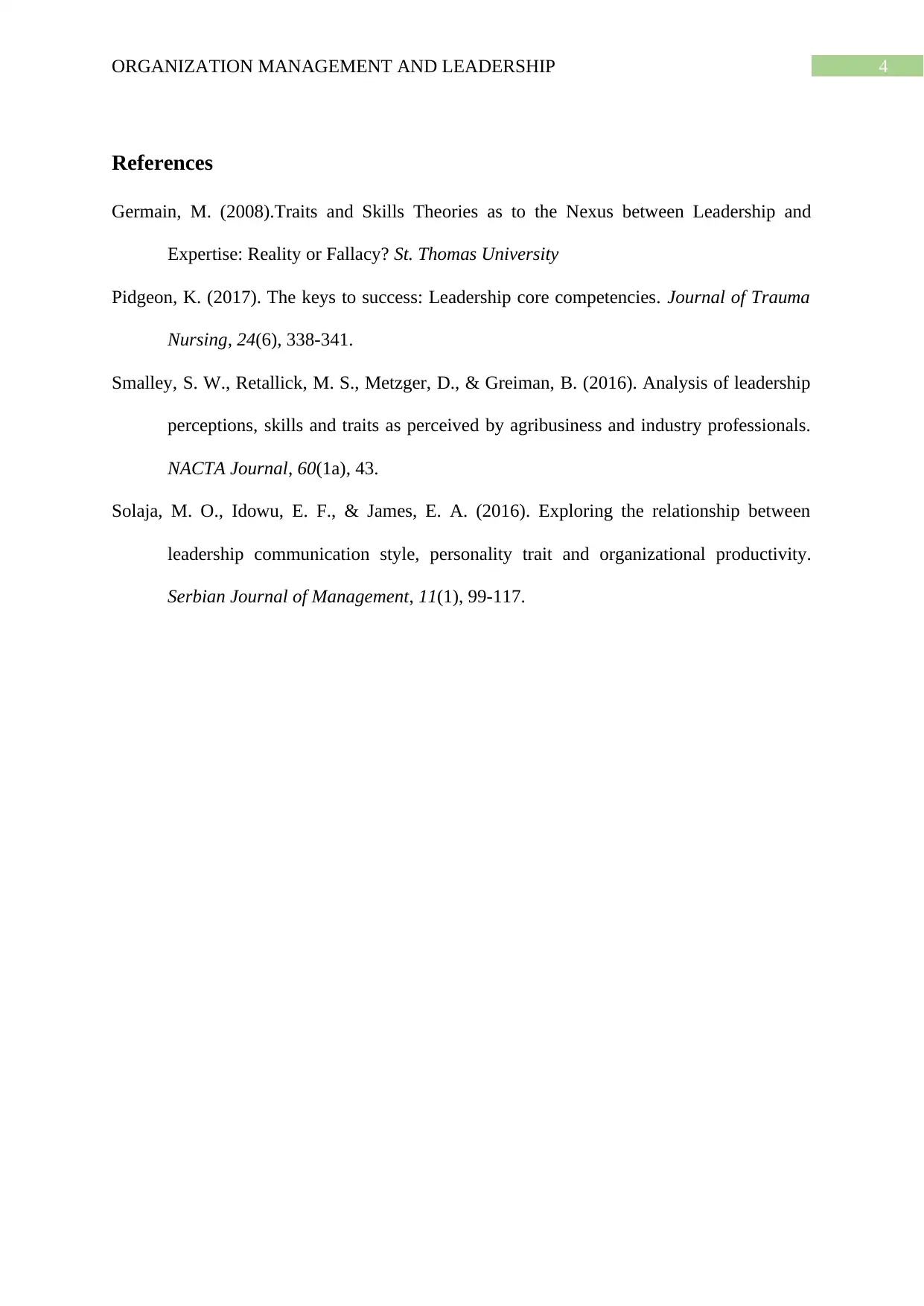
4ORGANIZATION MANAGEMENT AND LEADERSHIP
References
Germain, M. (2008).Traits and Skills Theories as to the Nexus between Leadership and
Expertise: Reality or Fallacy? St. Thomas University
Pidgeon, K. (2017). The keys to success: Leadership core competencies. Journal of Trauma
Nursing, 24(6), 338-341.
Smalley, S. W., Retallick, M. S., Metzger, D., & Greiman, B. (2016). Analysis of leadership
perceptions, skills and traits as perceived by agribusiness and industry professionals.
NACTA Journal, 60(1a), 43.
Solaja, M. O., Idowu, E. F., & James, E. A. (2016). Exploring the relationship between
leadership communication style, personality trait and organizational productivity.
Serbian Journal of Management, 11(1), 99-117.
References
Germain, M. (2008).Traits and Skills Theories as to the Nexus between Leadership and
Expertise: Reality or Fallacy? St. Thomas University
Pidgeon, K. (2017). The keys to success: Leadership core competencies. Journal of Trauma
Nursing, 24(6), 338-341.
Smalley, S. W., Retallick, M. S., Metzger, D., & Greiman, B. (2016). Analysis of leadership
perceptions, skills and traits as perceived by agribusiness and industry professionals.
NACTA Journal, 60(1a), 43.
Solaja, M. O., Idowu, E. F., & James, E. A. (2016). Exploring the relationship between
leadership communication style, personality trait and organizational productivity.
Serbian Journal of Management, 11(1), 99-117.
1 out of 5
Related Documents
Your All-in-One AI-Powered Toolkit for Academic Success.
+13062052269
info@desklib.com
Available 24*7 on WhatsApp / Email
![[object Object]](/_next/static/media/star-bottom.7253800d.svg)
Unlock your academic potential
Copyright © 2020–2026 A2Z Services. All Rights Reserved. Developed and managed by ZUCOL.





